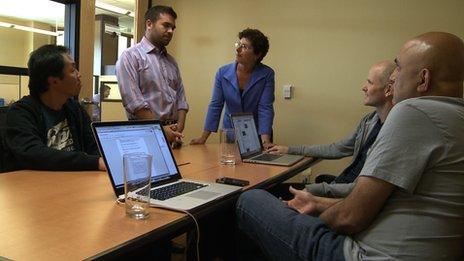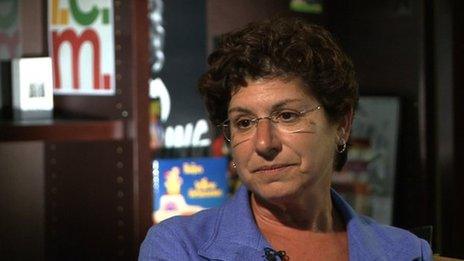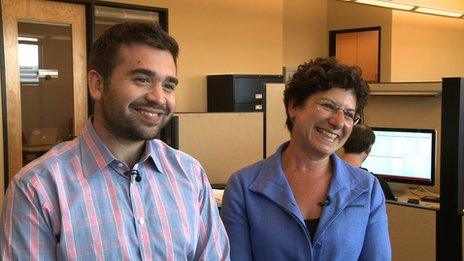Judy Estrin: Addicted to team-building at Evntlive
- Published
Judy Estrin: 'I'm addicted to the excitement of building teams'
The reasons that drive people to start businesses are many and varied. Some entrepreneurs are driven by a need to be the boss. They dream of creating a huge enterprise - with them at the top.
Others see starting a company as simply a means to meet a particular need, and may find the business aspects boring and onerous.
There's another set of company founders who not only love the challenge of solving problems, but also love the actual process of creating start-ups.
The Californian serial entrepreneur Judy Estrin probably falls into the latter group.
"I guess I'm addicted to the excitement of building teams," she says.
Ms Estrin has been involved in the founding of eight businesses so far. She also has extensive experience of being at the top of some huge enterprises, through serving on the boards of companies such as Walt Disney, FedEx and Sun Microsystems.
'Jazz band' method
Ms Estrin says that, while she greatly enjoys and values her work with big companies, what excites her most is working in a smaller environment.
"The best innovation happens when you have teams that are no bigger than a jazz band," she says.

Judy Estrin and a quartet-sized team discuss business
She says she did try to break her addiction to start-ups for a while - but what drew her back in was when her son got involved in launching a company.
That business is Evntlive, a firm that streams live and on-demand concerts and events over the internet. The company has featured artists such as Bon Jovi, Moby, Wale and events such as the Mountain Jam festival.
Pay-per-view costs typically range from around $3 to $11 (£2-£7), and vary depending on whether the concert is live or recorded.
The enterprise seems to have entered a crowded marketplace, competing with many other streaming services from companies such as Netflix, and cable and satellite TV.
However Ms Estrin believes that Evntlive can gain an edge over competitors by offering lots of extra features, such as additional content and integration with social media, allowing fans to communicate easily with each other during events.
"We have what we call a 'buzz' feature, which is commenting and so everybody who's watching the concert can be commenting," she says.
'Smart people'
Ms Estrin studied at the University of California, Los Angeles, and subsequently at Stanford University, where she worked with Vint Cerf, one of the pioneers of the internet.

Ms Estrin was bitten by the start-up bug
Despite having offers to work at several big firms, she joined a small new company called Zilog, because "a friend of my father's said that the smartest people he knew were at that company".
Zilog was involved in making silicon chips. Ms Estrin says she found it both exciting and enlightening working at a technology start-up.
Something she found particularly valuable was being included in the customer feedback loop, something that could happen only because the firm was still small. "In a big company, the engineers are very separated from the problems of the customer," she says.
Bitten by the start-up bug, Ms Estrin left Zilog in order to launch companies of her own. Together with her then husband Bill Carrico, she founded Bridge Communications, which was an early pioneer of computer networking devices.
She went on to launch a string of other businesses. One of these, Precept Software, was acquired by technology giant Cisco. Ms Estrin joined Cisco, and spent two years with the firm as chief technology officer.
But not all of her ventures proved to be successful - one company eventually had to be closed down. Ms Estrin says it was an "awful" experience, not so much because of the notion of failing, but because "this group of people were going to not have jobs the next day".
Nevertheless, she says that failure is "an inherent part of entrepreneurship". It's difficult to learn and improve if you don't take some risks.
A new chapter
Something she points out in her book Closing the Innovation Gap, is that not enough attention to the different levels of success.
"You can be a mid-level success and you can still be having a lot of fun solving a lot of good problems, making money for your investors. Not every company is a Google or a Facebook," she says.
After taking some time out to work on her book, Ms Estrin found herself drawn back in to the start-up world by her son, David Carrico, when he and his co-founders were setting up Evntlive.

It's a family affair: Judy Estrin and son David
Mr Carrico says he's heard "horror stories" about involving family members in businesses. But he felt he needed to do what was best for the company, "and I didn't know of a better entrepreneur in my network that I could enable to be a partner in this".
Ms Estrin provided initial funding herself, and after acting as an adviser and mentor, she formally joined the team as chief executive.
She says the worst thing about working with her son is: "He calls me Judy instead of Mom… everything else is great."